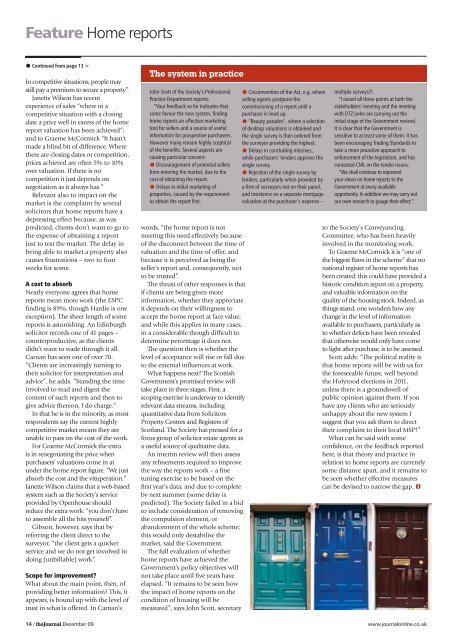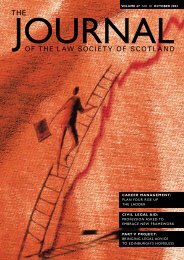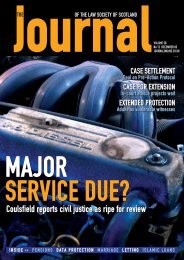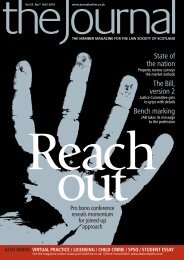Professional briefing - The Journal Online
Professional briefing - The Journal Online
Professional briefing - The Journal Online
You also want an ePaper? Increase the reach of your titles
YUMPU automatically turns print PDFs into web optimized ePapers that Google loves.
Feature Home reports<br />
Continued from page 13 ><br />
In competitive situations, people may<br />
still pay a premium to secure a property”.<br />
Janette Wilson has recent<br />
experience of sales “where in a<br />
competitive situation with a closing<br />
date a price well in excess of the home<br />
report valuation has been achieved”;<br />
and to Graeme McCormick “It hasn’t<br />
made a blind bit of difference. Where<br />
there are closing dates or competition,<br />
prices achieved are often 5% to 10%<br />
over valuation. If there is no<br />
competition it just depends on<br />
negotiation as it always has.”<br />
Relevant also to impact on the<br />
market is the complaint by several<br />
solicitors that home reports have a<br />
depressing effect because, as was<br />
predicted, clients don’t want to go to<br />
the expense of obtaining a report<br />
just to test the market. <strong>The</strong> delay in<br />
being able to market a property also<br />
causes frustrations – two to four<br />
weeks for some.<br />
A cost to absorb<br />
Nearly everyone agrees that home<br />
reports mean more work (the ESPC<br />
finding is 89%, though Hardie is one<br />
exception). <strong>The</strong> sheer length of some<br />
reports is astonishing. An Edinburgh<br />
solicitor records one of 41 pages –<br />
counterproductive, as the clients<br />
didn’t want to wade through it all.<br />
Carnan has seen one of over 70.<br />
“Clients are increasingly turning to<br />
their solicitor for interpretation and<br />
advice”, he adds. “Standing the time<br />
involved to read and digest the<br />
content of such reports and then to<br />
give advice thereon, I do charge.”<br />
In that he is in the minority, as most<br />
respondents say the current highly<br />
competitive market means they are<br />
unable to pass on the cost of the work.<br />
For Graeme McCormick the extra<br />
is in renegotiating the price when<br />
purchasers’ valuations come in at<br />
under the home report figure. “We just<br />
absorb the cost and the vituperation.”<br />
Janette Wilson claims that a web-based<br />
system such as the Society’s service<br />
provided by Openhouse should<br />
reduce the extra work: “you don’t have<br />
to assemble all the bits yourself”.<br />
Gibson, however, says that by<br />
referring the client direct to the<br />
surveyor, “the client gets a quicker<br />
service and we do not get involved in<br />
doing (unbillable) work”.<br />
Scope for improvement?<br />
What about the main point, then, of<br />
providing better information? This, it<br />
appears, is bound up with the level of<br />
trust in what is offered. In Carnan’s<br />
<strong>The</strong> system in practice<br />
John Scott of the Society’s <strong>Professional</strong><br />
Practice Department reports:<br />
“Your feedback so far indicates that<br />
some favour the new system, finding<br />
home reports an effective marketing<br />
tool for sellers and a source of useful<br />
information for prospective purchasers.<br />
However many remain highly sceptical<br />
of the benefits. Several aspects are<br />
causing particular concern:<br />
Discouragement of potential sellers<br />
from entering the market, due to the<br />
cost of obtaining the report.<br />
Delays in initial marketing of<br />
properties, caused by the requirement<br />
to obtain the report first.<br />
words, “the home report is not<br />
meeting this need effectively because<br />
of the disconnect between the time of<br />
valuation and the time of offer, and<br />
because it is perceived as being the<br />
seller’s report and, consequently, not<br />
to be trusted”.<br />
<strong>The</strong> thrust of other responses is that<br />
if clients are being given more<br />
information, whether they appreciate<br />
it depends on their willingness to<br />
accept the home report at face value;<br />
and while this applies in many cases,<br />
in a considerable though difficult to<br />
determine percentage it does not.<br />
<strong>The</strong> question then is whether the<br />
level of acceptance will rise or fall due<br />
to the external influences at work.<br />
What happens next? <strong>The</strong> Scottish<br />
Government’s promised review will<br />
take place in three stages. First, a<br />
scoping exercise is underway to identify<br />
relevant data streams, including<br />
quantitative data from Solicitors<br />
Property Centres and Registers of<br />
Scotland. <strong>The</strong> Society has pressed for a<br />
focus group of solicitor estate agents as<br />
a useful source of qualitative data.<br />
An interim review will then assess<br />
any refinements required to improve<br />
the way the reports work – a fine<br />
tuning exercise to be based on the<br />
first year’s data, and due to complete<br />
by next summer (some delay is<br />
predicted). <strong>The</strong> Society failed in a bid<br />
to include consideration of removing<br />
the compulsion element, or<br />
abandonment of the whole scheme;<br />
this would only destabilise the<br />
market, said the Government.<br />
<strong>The</strong> full evaluation of whether<br />
home reports have achieved the<br />
Government’s policy objectives will<br />
not take place until five years have<br />
elapsed. “It remains to be seen how<br />
the impact of home reports on the<br />
condition of housing will be<br />
measured”, says John Scott, secretary<br />
Circumvention of the Act, e.g. where<br />
selling agents postpone the<br />
commissioning of a report until a<br />
purchaser is lined up.<br />
“Beauty parades”, where a selection<br />
of desktop valuations is obtained and<br />
the single survey is then ordered from<br />
the surveyor providing the highest.<br />
Delays in concluding missives,<br />
while purchasers’ lenders approve the<br />
single survey.<br />
Rejection of the single survey by<br />
lenders, particularly when provided by<br />
a firm of surveyors not on their panel,<br />
and insistence on a separate mortgage<br />
valuation at the purchaser’s expense –<br />
multiple surveys?!.<br />
“I raised all these points at both the<br />
stakeholders’ meeting and the meeting<br />
with DTZ [who are carrying out the<br />
initial stage of the Government review].<br />
It is clear that the Government is<br />
sensitive to at least some of them. It has<br />
been encouraging Trading Standards to<br />
take a more proactive approach to<br />
enforcement of the legislation, and has<br />
contacted CML on the lender issues.<br />
“We shall continue to represent<br />
your views on home reports to the<br />
Government at every available<br />
opportunity. In addition we may carry out<br />
our own research to gauge their effect.”<br />
to the Society’s Conveyancing<br />
Committee, who has been heavily<br />
involved in the monitoring work.<br />
To Graeme McCormick it is “one of<br />
the biggest flaws in the scheme” that no<br />
national register of home reports has<br />
been created: this could have provided a<br />
historic condition report on a property,<br />
and valuable information on the<br />
quality of the housing stock. Indeed, as<br />
things stand, one wonders how any<br />
change in the level of information<br />
available to purchasers, particularly as<br />
to whether defects have been revealed<br />
that otherwise would only have come<br />
to light after purchase, is to be assessed.<br />
Scott adds: “<strong>The</strong> political reality is<br />
that home reports will be with us for<br />
the foreseeable future, well beyond<br />
the Holyrood elections in 2011,<br />
unless there is a groundswell of<br />
public opinion against them. If you<br />
have any clients who are seriously<br />
unhappy about the new system I<br />
suggest that you ask them to direct<br />
their complaint to their local MSP!”<br />
What can be said with some<br />
confidence, on the feedback reported<br />
here, is that theory and practice in<br />
relation to home reports are currently<br />
some distance apart, and it remains to<br />
be seen whether effective measures<br />
can be devised to narrow the gap.<br />
14 / the<strong>Journal</strong> December 09 www.journalonline.co.uk










